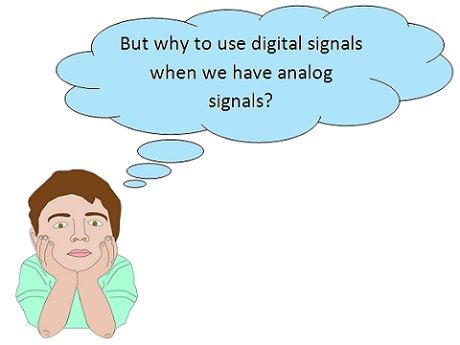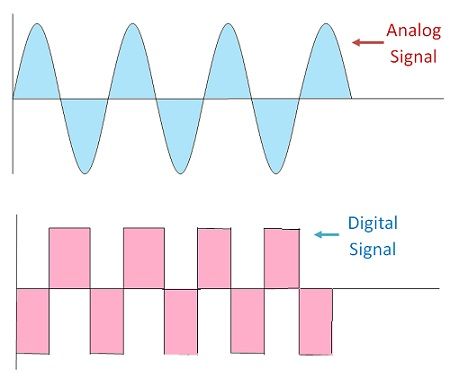Definition: Digital Electronics is the sub-branch of electronics that deals with digital signals for processing and controlling various systems and sub-systems. In various applications like sensors and actuators, usage of digital electronics is increasing extensively.
Digital Signals
Digital electronics is entirely the field in which digital signals is used. Digital signals are discretization of analog signals. A signal carries information. In digital signals, the values in a particular band is same i.e constant.
Digital signals form the basis of digital circuit and digital electronics.
 You must be thinking that why we need digital signals when we have analog signals and analog circuits. The reason behind this is analog signals are more likely to get affected by noise, while digital signals are noise immune. Besides, the designing and operations of a digital circuit is simpler than analog circuit.
You must be thinking that why we need digital signals when we have analog signals and analog circuits. The reason behind this is analog signals are more likely to get affected by noise, while digital signals are noise immune. Besides, the designing and operations of a digital circuit is simpler than analog circuit.
Thus, it is better to use digital signals if we need accurate and precised operation of the devices. Now, the question emerges that why digital signals are noise immune. What makes them perform better in noise interference. To understand this let’s consider both the signals analog signals and digital signals.

It is evident from the above diagram that analog signal is a continuous tome varying signal while digital signal consists of discrete values of voltage and thus it do not varies continuously with time.
Advantages of Digital Systems
- Easier Designing: The Digital systems can be easily designed as they involve digital signals. These signals do not require exact value at a particular time but it consists of range of particular values of voltage. Thus, it comprises of basically two values 0 and 1 I.e high or low.
- Noise Immune: Digital systems are noise immune because digital signal consists of range of particular values. Thus, when noise is introduced in the medium and digital signal and analog signal both passes through it. The analog signal will be affected more because it varies continuous with time so it is difficult to identify that noise has destroyed which value of voltage. While in case of digital system, noise effect the particular range of the signal thus, it is clear to identify the particular range of filtering is also easy in case of digital signals.
- Information Storage is Simpler: The storage of information in digital systems is easy. It can be stored by latching thus, the it can be stored for a long period of time.
- High Accuracy And Precision: The digital signal offers high accuracy and precision. This is because the processing of digital signal is done through the switching circuit. While in case of analog signals the processing and its output is highly dependant on circuit components. The accuracy obtained in analog circuits is restricted to 3-4 digits while in case of digital signals the accuracy is far more than the analog circuit.
- Programmable: The digital systems are easily programmable but analog system becomes complex when excessive programming of components is done.
Disadvantages of Digital Systems
Everything comes up with pros and cons. Similarly digital systems too hold certain disadvantages which are as follows:-
- Expensive: Digital systems are expensive because it involves switching elements.
- Analog nature of Real World Entities: We need to convert the digital output in analog form because all the real world entities are analog.
Digital to Analog and Analog to Digital Conversion
These types of conversion circuits are required so that we can convert analog signal into digital and then process the digital signal using digital systems and convert back the digital signal into analog form so that it is can be understood by real world.

In this way we can convert one form of signal into another form and process it digitally.
Joe Phillips says
I like this. Wish at my college we had this training. They dumped it though, lack of interest. Engineering is a fascinating study and I hope more are interested in it. I started electronics at age ten w/kits and later junk radios.